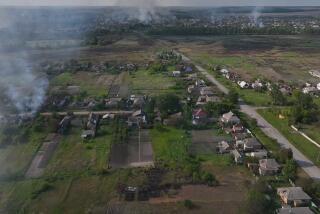Province Burns as Bombs Light Sky, Serbs Torch Homes
- Share via
PRISTINA, Yugoslavia — A NATO airstrike sprayed burning shrapnel through a car driving along a main street Monday during the heaviest daytime raids yet on Kosovo’s capital, killing three passengers and seriously wounding a fourth.
Despite cloud cover that might impede NATO air attacks, two powerful blasts shook Pristina about 10 a.m. Two much heavier explosions rocked the city at 2:25 p.m., followed by two more blasts at Pristina’s already devastated army barracks and the four-lane road outside. One of the explosions knocked out a power station, leaving most of the city without electricity.
Early this morning, five bombs fell near a fuel storage depot, setting off heavy explosions and a huge fire that lighted up the sky. After the attack, one of the white fuel tanks could still be seen intact in the glow of the flames.
As NATO planes roared overhead Monday afternoon, hundreds of ethnic Albanians about 12 miles southwest of Pristina were fleeing in a convoy of about 130 tractors pulling wagonloads of villagers.
In Pristina, just minutes after a missile exploded Monday near a blue Ford Escort, journalists saw one of the dead in the rear passenger seat with a hole the size of a fist in the back of his head.
He was wearing a camouflage police uniform. Several police wept and hugged each other after loading his body into the back of a white van.
A police officer at the scene, across the busy street from the main army barracks, claimed that the victims in the two-door car were all civilians. Whether they were or not, it appeared that anyone in a civilian car might wonder if they, too, could be at risk.
Pieces of what the Yugoslav army identified as a NATO missile lay in front of the car.
The remnants included coils, a scorched canister and what looked like a small motor blade. Flying shrapnel had gouged large divots in the asphalt, creating a spray pattern that spread out from the car.
In the countryside, where ethnic Albanians were heading toward the border, some tractors were towing cars with Pristina license plates. The cars were hitched by rope to wagons covered with plastic tarps to keep the refugees and their few belongings warm and dry.
A few miles farther down the road, about 50 tractors and cars were leading the way southwest toward the Albanian border.
Although some of the refugees were young men, most were women, children and the elderly, and as they moved slowly down the road, villages were burning far off on the horizon.
When one foreign journalist tried to ask where the refugees were coming from, and why, a Yugoslav army officer stopped on the roadside, backed up by an armored vehicle carrying several soldiers in black masks.
As one of them panned a turret-mounted machine gun slowly back and forth at the passing column of refugees, the army officer checked the journalists’ papers and then ordered them to leave.
As the journalists drove on toward Djakovica, a town about 70 miles southwest of Pristina near the Albanian border, they passed two houses newly set on fire beside the road. A police officer in camouflage fatigues strolled nearby, his AK-47 assault rifle pointing at the ground and swinging idly at his side.
The journalists’ trip to Djakovica was approved but not escorted by government officials.
Apart from a few soldiers and police, the central Drenica region of Kosovo was empty of people. Less than two months ago, it was the stronghold of the separatist Kosovo Liberation Army.
Packs of dogs and wandering farm animals were all that was left of village life. At Dolac, where the route turns south to Djakovica, five horses lay dead in the middle of the road where they had been shot.
The Yugoslav government said its troops battled KLA guerrillas along the mountainous border with Albania due west of Djakovica for several hours Monday. It claimed that its forces killed about 150 KLA fighters.
Just outside Djakovica, dense black and gray smoke poured from houses burning in at least two villages. The city itself was quiet and empty except for soldiers and police on patrol or standing guard outside key buildings.
At NATO’s daily briefings in Brussels, Djakovica has been named as the site of a possible “rape camp,” where ethnic Albanian woman allegedly have been sexually abused by Serbian security forces. In a city under tight military control, it was impossible to investigate the claims.
Other reports have described Djakovica as a destroyed city, which is far from true. Although several shops have been looted, arsonists and thieves have done less damage to Djakovica than to Pristina or, worse, the northern town of Podujevo where large parts have been razed by fires.
At its Sunday briefing, NATO showed reporters grainy aerial photographs of what it said may be a mass grave in a village that the alliance identified as Pusto Selo.
When journalists in Pristina asked a local official for permission to visit Pusto Selo and see for themselves whether what appeared to be a long covered trench in the NATO photos was a mass grave, the official was baffled. After searching for Pusto Selo on a detailed map, he said he couldn’t find it, and then pointed out that in Serbian the name means Deserted Village.
*
All of Paul Watson’s dispatches from Kosovo are available on The Times’ Web site: https://www.latimes.com/dispatch.
More to Read
Sign up for Essential California
The most important California stories and recommendations in your inbox every morning.
You may occasionally receive promotional content from the Los Angeles Times.













